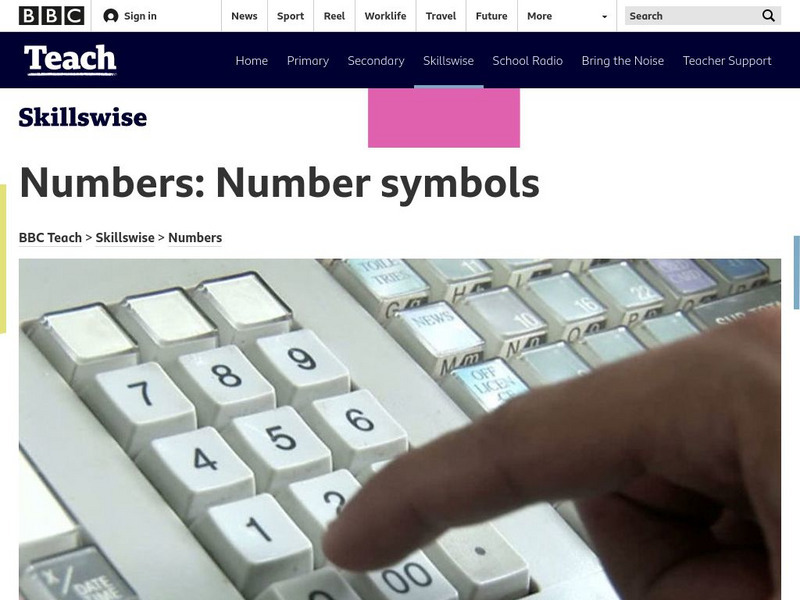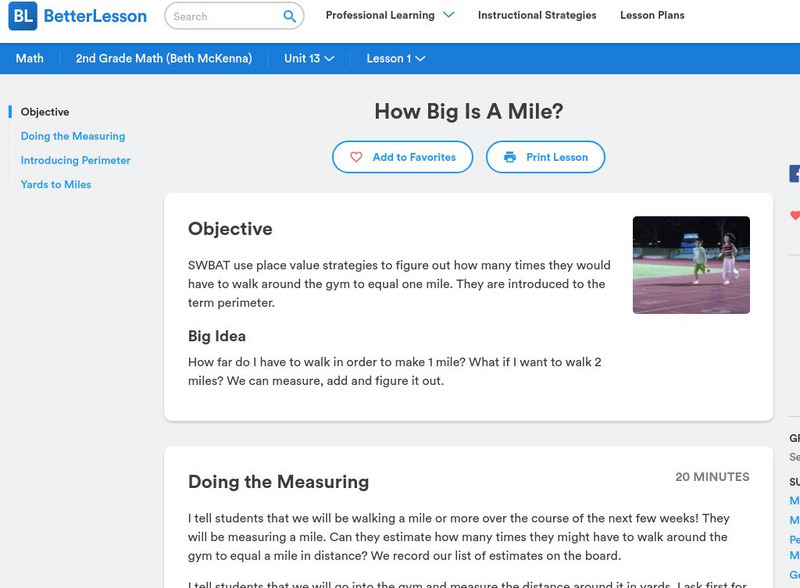Better Lesson
Better Lesson: Adding and Subtracting Multiples of Ten
Students will apply the idea of adding or subtracting ten to a number by adding or subtracting multiple groups of ten from a number. Included is a detailed lesson plan, videos of the lesson in action, materials and worksheets, and center...
PBS
Pbs Learning Media: Sesame Street: Financial Education
Every goal starts with taking the first step. Teaching kids to save money by collecting in a specific place such as a piggy bank or a jar shows kids concretely how much they are saving. Every time you save up to a certain small, new...
Homeschool Math
Homeschool Math: Comparing Decimals
This is a complete lesson with video instruction [5:49] and varied exercises about comparing decimals with 1 or 2 decimal digits.
BBC
Bbc: Skillswise: Number Symbols
This Skillswise site focuses on number symbols. Included are a video which explains how some numbers are used for amounts, fact sheets and worksheets for instruction, quizzes on the information presented, and games to practice the skill....
Better Lesson
Better Lesson: It's Elementary My Dear Watson
SWBAT identify and build numbers based on base ten language.
Better Lesson
Better Lesson: Comparing and Ordering Integers
Learners will compare and order integers on the number line. This lesson includes a detailed plan with lots of examples, a screencast of the lesson, and slides containing notes and problems.
Better Lesson
Better Lesson: Constructing Tens and Ones
Students get a hands-on, minds-on experience with counting, while also constructing an understanding of tens and ones. This lesson includes a detailed plan, a link to a song about teen numbers, a video showing students engaging in...
Better Lesson
Better Lesson: How Big Is a Mile?
How far do I have to walk in order to make 1 mile? Students measure, add, and figure it out.
Better Lesson
Better Lesson: Patterns in Larger Numbers
Patterns are everywhere. We can use patterns to help us deal with larger numbers
Better Lesson
Better Lesson: Larger Number Patterns
Second graders can find patterns in 4-digit numbers that will help them when counting over decades and centuries.
Better Lesson
Better Lesson: Pets, Pets and More Pets
Second graders love to talk about pets and in this lesson they can share how many pets they have.
Better Lesson
Better Lesson: Larger Numbers: A Tie to Social Studies
I want my students to realize that numbers are everywhere and math is applicable to almost all other subjects. Geography offers a perfect opportunity for students to make this connection.
Better Lesson
Better Lesson: Writing and Solving Number Stories
We can apply math to almost every part of the day and make math have a purpose for students.
Better Lesson
Better Lesson: Patterns in Nature
Are there patterns in nature that can be described by numbers? That is what we will find out here.
Better Lesson
Better Lesson: Trimester Assessment Day
It is important to assess understandings of concepts that students have worked on before moving ahead with new concepts or higher level thinking.
Better Lesson
Better Lesson: Let's Review
Revisit, Revisit, Revisit! Students need repeated exposure to math concepts to really understand how they work.
Better Lesson
Better Lesson: Using a Pattern to Solve a Problem
Patterns are prevalent in all levels of math. Common Core Standards expect students to be able to use structure - like that found in repeating the patterns of odd and even numbers or counting by 5s or 10s - to solve problems (MP7).
Better Lesson
Better Lesson: Missing Number Equations
Second graders will become more comfortable making sense of equations presented in missing answer (traditional) and missing number ( nontraditional) formats.
Better Lesson
Better Lesson: Making Change Using Partners of One Hundred
Using dimes to make change is another way to work with subtracting tens within 100.
Better Lesson
Better Lesson: Subtracting With Partners of 100
When subtracting ten from a 2 digit number, 2nd graders should be able to compute the answer as fluently and comfortably as do when they add ten to a 2 digit number.
Better Lesson
Better Lesson: More Dimes and Dollars
Second graders need practice using coins and dollars and relating them to ones, tens and hundreds. Common Core standards include counting by 10s and 100s.
Better Lesson
Better Lesson: Patterns Make Ten
This lesson builds a foundation for adding larger numbers which is supported by the Common Core standards for second grade.
Better Lesson
Better Lesson: Using Class Data
Second graders have greater engagement in learning when it is organized around gathering and using meaningful data.
Better Lesson
Better Lesson: Hundreds, Tens, Ones Are Coins Too
Second graders will extend their understanding of hundreds, tens and ones using dollars, dimes and pennies as another way to express groups of 100, 10 and 1.





